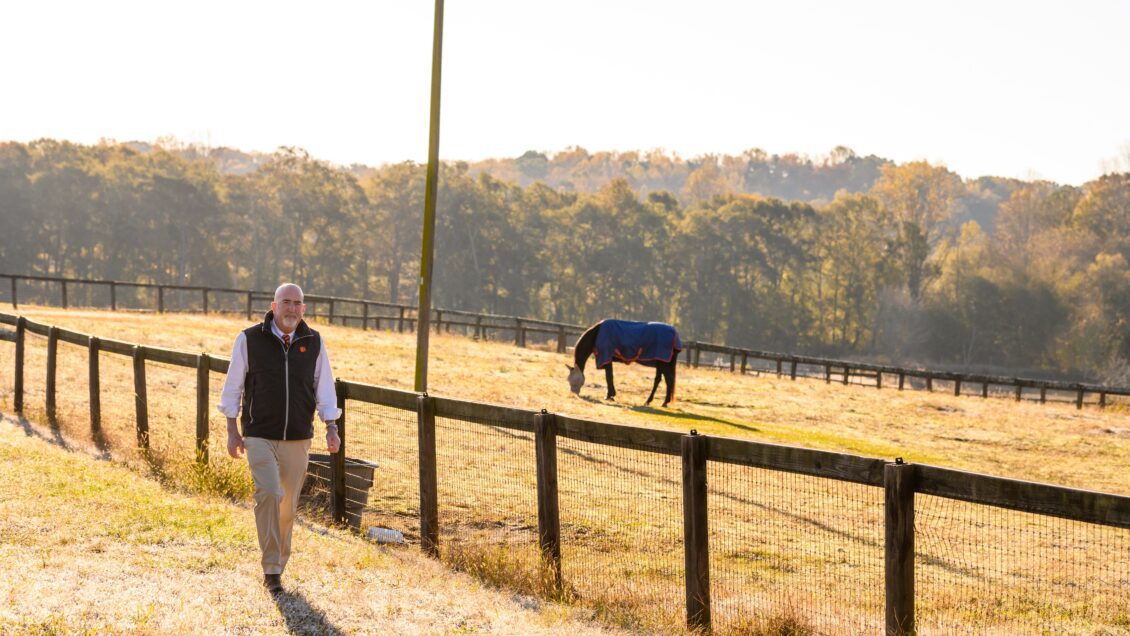Clemson University will soon be home to South Carolina’s first College of Veterinary Medicine (CVM). After approval by the Board of Trustees in June of 2023, the state legislature allocated money in the 2024 state budget to support the creation of the college. Since that historic moment, the CVM has inched closer to welcoming its first class of students.
Steven Marks was selected to be the founding dean and joined a growing team at the college. Starting a college from scratch begins with having the right people on board.
“We are building a leadership team first and will add staff and faculty as we get closer to the inaugural class in the Fall of 2026, pending accreditation,” said Marks. “We are moving through the process of accreditation with the American Veterinary Medical Association’s Council on Education. This accrediting body will evaluate all aspects of the CVM student experience, and a key element to this process is developing the curriculum.”
Faculty and staff will be added to complement a rigorous and robust curriculum designed to produce veterinarians who are prepared from day one after graduation to enter the workforce. CVM Graduates will have options to be a general practitioner or pursue additional training for diverse veterinary career paths, including research and clinical specialization.
“The curriculum is being designed in an intentional way to ensure that students get early and consistent hands-on clinical skills practice throughout the program,” said Nicki Wise, Associate Dean of Academic Affairs. “This, combined with our emphasis on professional development and integration of clinically relevant topics, will mean that Clemson CVM students will be ready to help animals and people in their communities right after graduation.”
Another major hurdle is designing a campus that will support and engage soon-to-be Doctors of Veterinary Medicine (DVM). A recently released artist rendering showcases a beautiful multi-building campus nestled adjacent to Clemson’s Experimental Forest. Students will be completely immersed in the CVM experience. From shared collaborative spaces to a high-fidelity simulation lab, students will have access to unique state-of-the-art facilities.
“The process to design our campus is rooted in purpose,” said Marks. “Our top priorities will be teaching and research. To support teaching, our space will facilitate a nurturing educational experience that involves both classrooms for didactic teaching and hands-on teaching laboratories. The DVM curriculum is challenging and requires long hours of work and study. The buildings are being designed to blend seamlessly with the Clemson Experimental Forest and to be a welcoming space for our students, staff and faculty.”
The final year experience for Clemson CVM students will be clinical rotations at a variety of veterinary practices and spaces around the region. This is called the distributive model, where students will strengthen what they’ve learned in a real-world setting. This is an alternative to the teaching hospital model.
“It was a smart choice to make CVM a distributive model,” said Dianne Dunning, Associate VP of Strategic Planning and Initiatives. “Students will experience everything from general veterinary practice to farm and food animal to zoo animal medicine. Not only will students refine their skills as veterinarians, but they’ll also learn the soft skills they’ll need to be successful working with people and their animals.”
The journey to welcome Clemson’s first class of students in the Fall of 2026 is just beginning. Like assembling a puzzle, the key is gathering all of the right pieces together and ensuring they fit together perfectly.
“We hope to attract a talented group of staff and faculty who will leverage our top-notch facilities to produce veterinarians who are confident, skilled, and ready to work in a variety of areas within the great state of South Carolina,” said Marks. “There will be special efforts to train veterinary clinicians to work with cows, equine, poultry and other livestock to help animal owners and our agricultural community. Of course, the underpinning of this work includes working towards the goals that will preserve the core values of Clemson University.”
Get in touch and we will connect you with the author or another expert.
Or email us at news@clemson.edu

